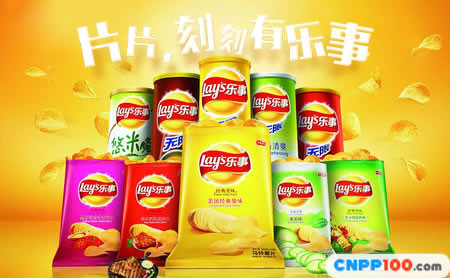
Pepsi (China) Investment Co., Ltd., Lays, the top ten brands of potato chips, began in 1932, a classic potato chip brand from the United States, and has become a Pepsi product since 1965
Lay's (Walkers in the UK and Ireland, Chipsy in Egypt, Poca in Vietnam, and Tapuchips in Israel) is an American potato chip brand, the name of a company founded in 1932, and a PepsiCo product since 1965.
In 1932, two young entrepreneurs, thousands of miles apart, each had two separate companies, but their goals were the same, with the same basic philosophy: "To provide customers with the highest quality and value for their products and sell them at real prices!" Elmer Doolin of San Antonio and Herman W. Lay of Nashville each do their potato processing, and it's these two young people who create potato chips that are loved all over the United States and around the world!
In 1932, Elmer Doolin was drinking coffee at the San Antonio Spurs Cafe and bringing his own potato chips and sandwiches to accompany his meal, but unexpectedly, this salty nachos became the most popular snack. Mr. Doolin started in his mother's kitchen, and because he couldn't afford to hire workers, Doolin himself, his mother, and his brother were the first workers, and they spent the night with mashed potatoes, cooking, and selling the chips for 5 cents a bag. At this time, the value of the family's labor is $10 per day. In the era of not many snacks, the introduction of potato chips was very popular, and they began to constantly look for big customers, but also looking for high-quality potato sources. Sales are increasing and profits are growing. Gradually, workers began to be hired, and the company gradually expanded.
When Herman W. Lay arrived in San Antonio from Nashville in 1937, the two began working together to form Lay's and move the factory to Dallas, closer to where the ingredients were produced. In 1937, he began to use the best potatoes in the United States, and began to dabble in other small snacks. Peanut butter, sandwiches, etc. The company adopts automatic presses and assembly line operations. Los Angeles became their sales hub. During World War II, Lay's contributed to the nation's ration of war materiel, but suffered severe trauma due to a lack of experience.
In 1945, the United States returned to the era of peace, experienced a boom, a large population, a newfound boom, and a large consumer demand began. Lay's established a sales company, and production and sales were separated. Its sales and distribution process is short and fast. In 1950, Fritos was sold in 48 states, and by 1962, it was available in 48 countries.
In 1954, Lay's annual sales reached $21 million. In 1956, Lay's became the No. 1 fast food company in the country. In 1958, sales revenue exceeded $50 million. Under Mr. Doolin's leadership, a small kitchen has become a company with hundreds of millions of assets. By the time of Mr. Doolin's death in 1959, Lay's had grown to more than 40 products and employed more than 3,000 people.
Today, Lay's potato chips are among the top 10 snacks in the United States. Lay's potato chips have many die-hard fans not only in Europe and the United States, but also in Asia. At present, it is endorsed by Luo Zhixiang, a little pig, and Zhang Shaohan, a little diva in the music world.
PepsiCois one of the largest food and beverage companies in the world. In 2010, the sales revenue was nearly 60 billion US dollars. We employ approximately 294,000 people worldwide and operate in nearly 200 countries around the world.
For PepsiCo, the PepsiCo Promise means sustainable growth by preserving a healthy future for the public at large and our planet. As a global food and beverage company with many high-quality, household names such as Quaker Cereal, Tropicana, Gatorade, Lay's and PepsiCo, we continue to develop delicious and healthy food and beverages, find innovative ways to reduce energy consumption, conserve packaging materials, and provide an ideal working environment for our employees. At the same time, we will continue to hire local staff, design and develop products that meet local tastes, and build partnerships with local farmers, government departments and community groups to show our support for the communities in which we operate and do our part to protect the health of the public, care for the future of the planet, and realize PepsiCo's vision. That's our commitment.
As a result of its sustainability efforts, PepsiCo was included in the Dow Jones Sustainability World Index (DJSI World) for the fourth time and the Dow Jones Sustainability Index (DJSI North America) for the fifth time in 2010.
In 2009 and 2010, the PepsiCo brand ranked 23rd on the "Top 100 Global Brands" jointly selected by BusinessWeek and Interbrand with a brand value of more than $14 billion, and in 2010 it increased its brand value by 3% compared to 2009. In 2011, PepsiCo ranked No. 26 on the World's Most Admired Companies list, No. 2 on the Most Admired Consumer Food Products list, and No. 137 on the 2011 Fortune 500 list. At the same time, we were also ranked at the top of the "Most Ethical Companies List" by the Swiss company Covalence, ranking third out of 581 companies in 18 industries for excellent business ethics and first in the food and beverage category.
PepsiCo's portfolio includes 19 brands with annual sales of more than $1 billion. The 19 brands are: Pepsi-Cola, Mountain Dew, Gatorade, Lay's, Pepsi Light, Pepsi Max, Tropicana, Doritos, Lipton Teas, Quaker Oats, Cheetos, 7-UP, Mirinda, etc.












